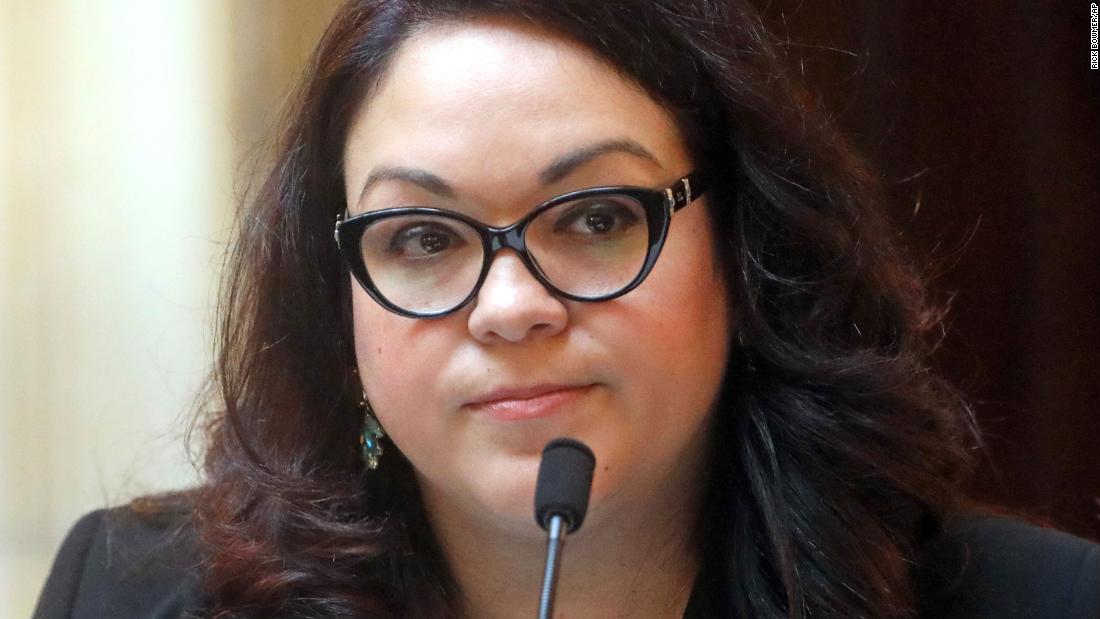
Now, she's running to become the city's first Latina mayor.
Escamilla, 41, has spent the last weeks of her campaign facing her opponent in numerous debates, responding to questions about her faith and knocking on doors in the city's west side -- a traditionally underrepresented area that she calls home.
"It wasn't planned at all," Escamilla said about her career in politics. "I needed to react according to the needs that I was facing in my community."
She learned about those needs while serving as a Democratic state senator in Utah for more than a decade and by helping small businesses as an executive for Utah-based Zions Bank. Escamilla has championed minorities since her student days at the University of Utah, when she realized she was the only person with black hair sitting in a freshman philosophy class. She tutored immigrant students in English.
"I was learning how many disparities there were, how much the ZIP code where you were living was determining the abilities of a child to succeed in school or not," Escamilla said. "I started thinking, 'This is not okay, what can I do to change that?"
Latinos are the largest minority in the state and they are 20% of Salt Lake City's roughly 200,000 residents, according to the latest US Census statistics. Other Latinas are involved in state and local politics, but none has led Utah's capital city.
She and her opponent, Salt Lake City Councilwoman Erin Mendenhall, 39, are both Democrats. They were the top candidates who moved to the general election after the primary in August. The state is largely dominated by Republicans but the city has elected Democratic mayors for decades.
Mendenhall has extensive experience in city government and has a similar platform than Escamilla.
The first Mexican immigrant elected state senator
Escamilla was born in Mexico City but her family moved around the country before settling in the border city of Tijuana. Her parents, both engineers, showed her since an early age that getting an education was a priority.
For two years, Escamilla and her brother crossed the border every day to attend high school in San Diego. When she graduated, she moved to Salt Lake City to attend the University of Utah. She hardly knew anyone and she missed her family, but she knew she had to stay focused.
"I really felt this sense of responsibility," Escamilla said. "My parents were working hard to give me this opportunity."
She had her mind set on becoming a business owner and maybe returning to the US-Mexico border. But she fell in love with the city and became involved with advocacy.
Over the past 22 years, Escamilla became a US citizen and worked in the non-profit sector and as a health policy analyst before fully turning her eyes to governance.
After earning her master's degree in public administration and leading the state's Office of Ethnic Affairs, she was elected to the Utah state senate in 2008. She was the first Latina and the first immigrant in the state's senate.
Olga de la Cruz, an entrepreneur and former mayor candidate in nearby Midvale City, said that historically few Latinos have sought public office in Utah.
"She is already breaking a lot of barriers and continues to be a role model for other Latinos considering to run for office," she said.
She doesn't want her religion to take center stage
A more personal side of Escamilla has been put into question during her campaign: her faith.
Escamilla, who is married and has six children between her and her husband, is member of The Church of Jesus Christ of Latter-day Saints. In recent months, critics have suggested her decisions could be influenced by faith leaders. The church is headquartered in Salt Lake City.
Former Salt Lake City Mayor Rocky Anderson, in a Facebook post in August, said Escamilla seemed "willing to do the bidding of the church, the developers, and the bank where she has been employed."
Escamilla has dismissed the attacks, saying that she has "voted for and against bills contrary to the LDS Church's position" during her time as a state senator.
"I have always been and will always be an independent voice for the people I represent," she wrote in a blog post addressing the criticism.
More than three decades have passed since the city had a mayor who belonged to the church. Mayor Ted Wilson, also a Democrat, served from 1976 to 1985.
One of her top issues is clean air
Escamilla said there's not enough collaboration between local and state officials in key issues for the city, but she's confident she can build consensus.
If elected, she wants to address issues like affordable housing, sustainability and improving air quality. She hopes that her vision combined with her experience in the Legislature will resonate across Salt Lake City.
Many of Escamilla's priorities are focused on building a better future for the city and its younger residents.
"My 3-year-old has asthma and I developed asthma in the past five years. It's pretty personal when you see your children sick," Escamilla said.
Her daughter has been forced to take medication during the winter months and sometimes struggles with a cough when she runs.
To reduce air pollution, Escamilla is focusing on transportation. She's pushing for more mass transit usage, alternative modes of transportation and making neighborhoods more walkable.
"I want (my daughter) to have the quality of life that I've enjoyed in Salt Lake City, " Escamilla said, "and I'm fighting hard to improve the air quality for her."
Bagikan Berita Ini














0 Response to "Salt Lake City could make history by electing its first Latina mayor"
Post a Comment